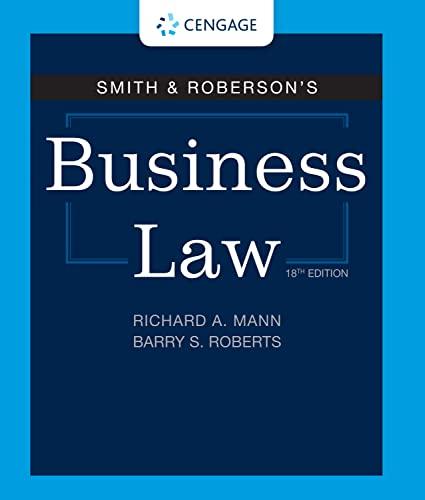Question
Case Study Analysis (10%) Objective In this assignment, as a group, you will select a case study involving the hospitality industry. You can select one
Case Study Analysis (10%)
Objective
In this assignment, as a group, you will select a case study involving the hospitality industry. You can select one of the many case studies from the textbook, or you can choose one outside of the textbook, so long as it is relevant to the hospitality industry. In groups of no more than 5, you will provide a 5-7 minute presentation on your findings. Presentations will be done during class time. You will select your own groups; if you cannot find a group, please contact me and I will place you in a group.Please have your group members and case submitted to your professor by October 13th, 2023, 11:59pm.
Process
- Find and select a case study related to the hospitality industry.
- As a group, review and discuss the case study.
- Answer the following questions (note this should be the content of your presentation)
- What are both sides of the argument presented (plaintiff and defendant)?
- What is the legal precedent for this case (what previous rulings relate to this case)?
- Analyze why is this case significant to the hospitality industry?
- Analyze the case and relate it to information that we learned from class.
- What was the decision? Do you agree with the decision?
case study is Bruke V. Hudsons Bay Co., 2010 SCC 34(CanLII), [2010] 2 SCR 273
| REASONS FOR JUDGMENT: (paras. 1 to 97) | Rothstein J. (McLachlin C.J. and Binnie, LeBel, Deschamps, Fish, Abella, Charron and Cromwell JJ. concurring |
______________________________
Burke v. Hudson's Bay Co., 2010 SCC 34, [2010] 2 S.C.R. 273
Peter Christopher Burke, Richard Fallis and
A. Douglas Ross, personally and in a representative capacity Appellants
v.
Governor and Company of Adventurers of England Trading into Hudson's Bay and Investors Group Trust Company Ltd. Respondents
Indexed as:Burke v. Hudson's Bay Co.
2010SCC34
File No.:32789.
2010:May18; 2010:October7.
Present:McLachlin C.J. and Binnie, LeBel, Deschamps, Fish, Abella, Charron, Rothstein and CromwellJJ.
ON APPEAL FROM THE COURT OF APPEAL FOR ONTARIO
Pensions Pension plans Surplus Ongoing defined benefit pension plan Sale of division of company resulting in employees being transferred to new company Transferred employees removed from former employer's pension plan and incorporated into new pension plan At time of transfer, former employer's pension plan had significant projected surplus Former employer transferred enough pension funds to cover transferred employees defined benefits but no surplus funds transferred Whether there was an obligation on former employer to transfer a pro rata portion of surplus on sale Whether former employer's obligations to transferred employees were satisfied by assuring their defined benefits Pension Benefits Act, 1987, S.O. 1987, c.35.
Conclusion
[94] I would dismiss the appeal on the issue of plan administration expenses. The HBC pension plan did not impose an obligation on HBC to pay plan administration expenses. HBC was permitted to charge plan administration expenses to the pension fund. The issue of whether HBC was permitted to take contribution holidays was not appealed. However, the language in the pension plan documents indicates that the employer's contributions were determined by an actuary. Therefore, the trial judge was correct in concluding that HBC was permitted to take contribution holidays.
[95] I would also dismiss the appeal on the issue of the transfer of the surplus. Gillese J.A. correctly found that the transferred employees did not have an equitable interest in the surplus of the pension fund. Their only interest was in their defined benefits. As the defined benefits were protected in the transfer, HBC did not breach any fiduciary obligation that it owed.
[96] I should emphasize that this decision depends upon the text and context of the pension plan documentation that was before this Court. An analysis of that documentation leads to the finding that the employees are not entitled to any portion of the surplus on their transfer to NWC. This decision does not purport to deal with other situations involving actuarial surplus and plan transfer. Each situation must be evaluated on a casebycase basis. Specifically, the resolution of the issue of surplus transfer when the pension plan documents indicate that employees are entitled to surplus on plan termination is best left to another case where that issue arises.
[97] The Court of Appeal's ruling on costs was not challenged in this Court. Gillese J.A. found that for this case it was appropriate for costs to be paid out of the pension trust fund because this case dealt with issues surrounding the due administration of the pension trust fund and was for the benefit of all the beneficiaries (Burke v. Hudson's Bay Co., 2008 ONCA 690, 241 O.A.C. 245). The parties submit that this is an appropriate case for costs in this Court to be paid to both parties on a full-indemnity basis out of the trust fund. Therefore, in accordance with the terminology used in this Court, I order costs on a solicitor-and-client basis in this Court, including costs of the leave application, to be paid to both parties out of the trust fund.
Step by Step Solution
There are 3 Steps involved in it
Step: 1

Get Instant Access to Expert-Tailored Solutions
See step-by-step solutions with expert insights and AI powered tools for academic success
Step: 2

Step: 3

Ace Your Homework with AI
Get the answers you need in no time with our AI-driven, step-by-step assistance
Get Started


